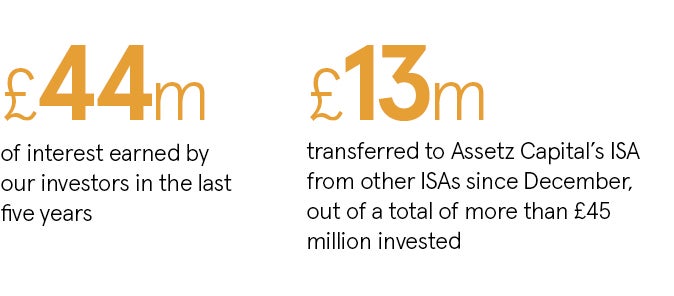Rising interest rates in the United States had brought hope that the UK might follow suit and improve rates for savers. But Brexit has dashed this optimism by keeping rates lower for longer here. Furthermore, Bank of England governor Mark Carney even said recently that a disorderly exit from Europe might prompt the Bank to slash rates again, not raise them.
So some of those who remember base rates at 5 per cent are realising they may not live to see them again. Furthermore, rising prices since the Brexit vote mean deposit rates are currently well behind inflation and savers are losing money in real terms.
An increasingly credible option is P2P lending, even though it is an investment, which comes with risk to capital, rather than a bank account. Assetz Capital’s target rates start from 4.1 per cent gross a year and our highest-returning automatic investment account offers a target of
6.25 per cent.
While not directly comparable, due to the differing risk profiles, the average time deposit account currently pays only 0.9 per cent, according to Bank of England figures. The £44 million interest that our investors earned in the last five years is certainly welcome in this new low-interest-rate world.
P2P lenders can offer these better rates as they have much lower overheads than traditional banks and generally deduct around 1 per cent a year from the borrower, then pass the rest to the investor.

In this context, it is not surprising that the decline in subscriptions to cash individual savings accounts (ISAs), which has been a trend since 2011, accelerated last year, according to HM Revenue & Customs figures. Our latest Investor Barometer survey also revealed that the proportion of investors who put money into cash ISAs fell from 52 per cent in quarter one this year to 37 per cent by the end of quarter two.
In contrast, Assetz Capital’s ISA, which launched in December 2017, has already attracted £13 million transferred from other ISAs and more than £45 million in total.
Investing in P2P lending can help the economy too, particularly through business lenders like us. By funding small and medium-sized enterprises (SMEs) that the banks have frozen out, P2P has become a substantial source of capital for these companies, and is helping deliver new jobs and economic growth.
Funding to SMEs from the traditional banking sector has shrunk since the financial crisis and continues to fall alarmingly, most recently due to banks’ uncertainty over Brexit. Rather than boosting SMEs, banks took a staggering £319 million funding out of the SME economy in the first four months of this year alone, according to Bank of England figures.
Alternative finance has been increasingly filling this funding gap for some time and now lends much more new money to businesses than the banking system. Assetz Capital is just one lender, but its new loans to SMEs were around half those of the entire traditional banking system over the last year and a half. Since we started six years ago, we have lent well over £500 million to SMEs.
There is a long way to go before P2P becomes mainstream and it still represents only a fraction of the £500 billion ISA market.
P2P lending is not a single investment solution; it should be part of an overall investment mix. If you move from a cash ISA to a P2P lending account, you are moving from savings to investment with an associated risk of capital loss. But equally many people seek a potentially higher return from their capital and want to avoid it falling behind inflation.
If you understand the risks, want fair returns, and an opportunity to support economic growth and new jobs, P2P lending is a great way to achieve it. We are part of the solution.
It is clear investors agree and are voting with their feet.
For more information please visit assetzcapital.co.uk

